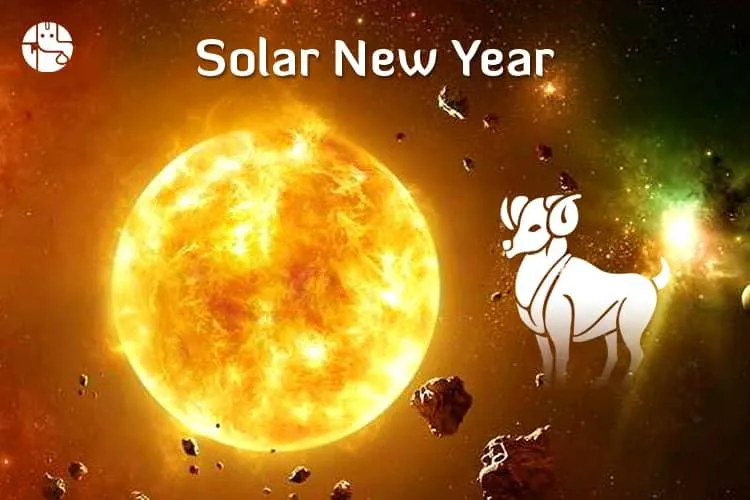The Solar New Year is the first day of the solar cycle year, i.e. Mesha Sankranti in the Hindu lunisolar calendar. It is also known as Maha Vishuva Sankranti and the day when Sun transits from Pisces to Aries. In many regions of India, Solar New Year is celebrated by different names and in different forms.
To mark the auspicious beginning, the New year in Odisha is celebrated as Pana Sankranti. In Tamil Nadu, the new year is celebrated as Puthandu. In Assam, Solar New Year is celebrated as Bihu, while in Bengal it is celebrated as Poila Baisakh. Mesha Sankranti is also celebrated by Punjabis i.e, the festival of Vaishakh.
The Sun God is worshipped by devotees on all the twelve Sankranti. Devotees on this day also perform many charitable activities. They donate food, money, clothes, etc. As per Hindu mythology, helping the poor and doing Seva on this day helps the individual to get rid of all the sins. The ten minutes before and after the Sankranti time is considered very auspicious for performing pujas and prayers.
Solar New Year 2023 Date
This year, the Solar New Year 2023 will be celebrated on 14th April. Below are the important timings to be considered for Mesha Sankranti :
Sunrise: 14th April, 2023 | Time: 6:21 AM
Sunset: 14th April, 2023 | Time: 7:00 PM
Punya Kaal Muhurat: 14th April 2023 | Time: From 10.55 AM to 06:46 PM
Maha Punya Kaal Muhurat: 14th April 2023 | Time: 01:04 PM to 05:20 PM
Sankranti Time: 3:12 PM
Rituals For Solar New Year | Mesha Sankranti
- On this day, devotees wake early in the morning and take a sacred bath in the holy rivers like Ganga, Jamuna, and the Godavari.
- It is very important for the devotees to know the Punya Kaal Muhurat to perform the rituals of Sankranti.
- Devotees while performing the rituals, chant mantras and stotras depending on the community they belong to.
- Some religions, on this day, prepare a special drink called Pana. After doing prayer, it is consumed by everyone as a prasad after performing the prayers.
- On this day, worshipping Lord Shiva, Hanuman, Vishnu and Maa Kali are considered quite auspicious.
- Devotees only prepare Satvik food on this day.
- They also donate food, clothes, money, etc to the needy and poor people.
It is advisable to perform personalized rituals for Mesha Sankranti, as it also helps to remove the ill effects of the negative planets in your birth chart. Consult our Expert Astrologers now!
Astrological Significance Of Solar New Year
The Sun takes one year to complete the transit through all the twelve zodiac signs, starting from Aries to Pisces. As per the Hindu Solar Calendar, Sun stays approximately for one month in each zodiac sign. So when the Sun enters Aries, also called Mesha Rashi, it marks the beginning of the Sun transit cycle which is known as Solar New Year or Mesha Sankranti.
Pandits and Astrologers always use the Solar calendar, hence, this is a very important day for them and is officially celebrated as the Solar New Year.
Wrapping Up
Sankranti means sacred changes and thus, the Solar New Year is a very vital day for Hindus. It also signifies the beginning of the summer season. On the day of Mesha Sankranti devotees also visit Puri Jagannath, Samaleshwari, Cuttack Chandi, and Biraja temples to seek the blessings of God. Ganesha wishes you all a very Happy Solar New Year and Mesha Sankranti!
To Get Your Personalized Solutions, Talk To An Astrologer Now!
With Ganesha’s Grace,
GaneshaSpeaks.com
